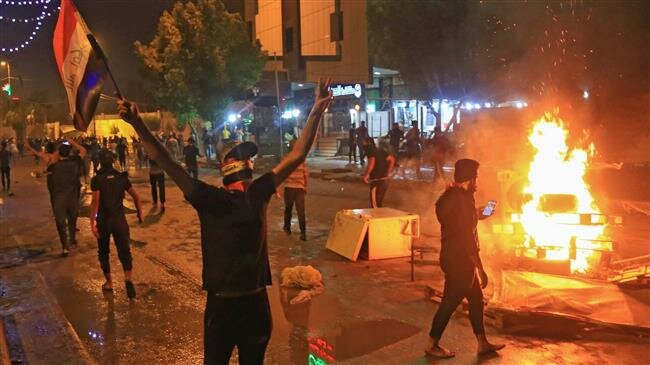Monday 28 October 2019 - 16:09
Story Code : 362341
Iraq unrest Day 3: Counter-terror forces deployed
The demonstrators gathered in Baghdad's central Tahrir (Freedom) Square on Sunday, continuing a second wave of protests that began Friday.
Young men erected barricades on a bridge leading to Baghdad's fortified Green Zone -- where Iraqi government buildings and foreign diplomatic missions are located -- in a bid to counter security forces who kept firing tear gas canisters to prevent them from entering the area.
As the unrest turned more violent, Iraq's elite Counter-Terrorism Service announced Sunday that it had deployed to the streets of the capital in order to protect important state buildings "from undisciplined elements."
Reuters quoted unnamed security sources as saying Saturday that the counter-terrorism forces have been told to "use all necessary measures" to end the protests.
The elite units clashed with protesters in the southern city of Nassiriya on Saturday night and arrested dozens of them.
They also attempted to disperse demonstrations in Tahrir Square but some protesters have regrouped.
So far, at least 67 Iraqis have been killed and hundreds more wounded in the second bout of unrest targeting Prime Minister Adel-Abdul Mahdi's government.
More than 150 people, including security forces, were killed when the protests first erupted earlier this month.
Iraqi security officials said back then that according to available evidence trained snipers, possibly hired by foreign parties, had been involved in the killings.
On Friday, Iraq's top Shia cleric Grand Ayatollah Ali al-Sistani called on protesters and security forces to keep anti-government demonstrations peaceful.
He also urged the demonstrators to avoid vandalizing the public properties, describing any act of vandalism as �illegal and illegitimate.�
The fresh demonstrations come after Abdul-Mahdi, who rose to power only a year ago, pledged more reforms aimed at improving economy. The premier said people were free to exercise their right to demonstrate, but violence would not be tolerated.
The unrest has brought instability back to Iraq after a brief period of calm that followed years of occupation by the United States and its allies as well as a deadly battle against the foreign-backed Daesh terrorist group.
Abdul-Mahdi has struggled to address the protesters' demands. The tensions have chased away some of his political allies, rattling his fragile coalition government.
One of the key figures to turn his back on Abdul-Mahdi was Iraqi cleric Muqtada al-Sadr, whose Saeroon bloc holds most seats in the parliament.
The parliamentary bloc said on Saturday that it would go into opposition until the protesters' demands were met.
"Resign before being dismissed," Sadr warned the Iraqi government and authorities in a Facebook post on Saturday night.
"If Iraqi officials do not wish to see killing and burning, these corrupt [officials] must protect the protesters and the nation," Sadr said, describing the angry protesters as "a group who wanted dignity, to live well" and have "a homeland without corruption.�
# Tags











